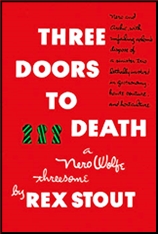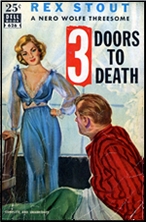Sun 16 Apr 2023
Nero Wolfe on Page and (Small U.S.) Screen: “Door to Death†by Matthew R. Bradley.
Posted by Steve under Reviews , TV mysteries[5] Comments
“Door to Deathâ€
by Matthew R. Bradley.
Like Trouble in Triplicate (1949), Rex Stout’s next Nero Wolfe collection, Three Doors to Death (1950), contains three novellas that first appeared in The American Magazine: “Man Alive†(December 1947), “Omit Flowers†(November 1948), and “Door to Death†(June 1949). In “Man Alive,†Archie informs us, “The only thing that shakes Wolfe as profoundly as having a meal rudely interrupted is a bawling woman. His reaction to the first is rage, to the second panic.†Wolfe allows that “I respect and admire Mr. Cramer,†despite his doing the former; the latter is their client, Cynthia Nieder, whom he must clear of suspicion in an haute couture murder…of a man reported to be a suicide a year earlier.

“Omit Flowers†involves Wolfe’s lifelong friend Marko VukÄić, introduced in Too Many Cooks (1938; the accents appear inconsistently). Marko is “one of the only three people who called him by his first name, but there were other factors. Rusterman’s Restaurant was the one place besides home where Wolfe really enjoyed eating…Marko owned it and ran it…â€
He asks Wolfe to clear Virgil Pompa, under whom he’d worked at Mondor’s in Paris in his youth, which Wolfe does, sans fee, as a favor; Pompa, say Marko, “forfeited all claim to professional respect,†becoming the #2 of the AMBROSIA restaurant chain, and is accused of murdering the man who married the founder’s widow and tried to oust him.
“Door to Death†finds Wolfe desperately seeking a replacement for Theodore Horstmann, “tender and defender of the ten thousand orchids in the plant rooms on the roof,†called to his critically ill mother’s side in Illinois…indefinitely. He finds one in Andrew Krasicki, formerly employed—and recommended—by Lewis Hewitt, after braving wet December weather to poach Andy from the estate of Joseph G. Pitcairn in the Westchester village of Katonah. Offering to show off a Phalaenopsis Aphrodite in flower, Andy takes him and Archie to the greenhouse, conspicuously marked “DANGER-DO NOT ENTER-DOOR-TO-DEATH” due to the use of ciphogene, the deadly fumigant from “Black Orchids†(1941).
Truer words were never painted—as those were by Mrs. Belle Pitcairn—for in addition to the P. Aphrodite sanderiana, they find her nurse and his fiancée, Dini Lauer, dead from it. Despite Wolfe’s pleading, Pitcairn’s prominence prompts Andy to be charged with first-degree murder by Ben Dykes, head of the county detectives; Lt. Con Noonan of the State Police; and Cleveland Archer, the county’s D.A. du jour after Anderson in Fer-de-Lance (1934) and Fraser in “Instead of Evidence†(1946). Well-meaning assistant Gus Treble says Dini “had given Andy the fanciest runaround he had ever seen,†and they have only Andy’s word for it that she had consented to marriage that day, so things look pretty bad.

Archer is unable to complete a jealous love triangle with Gus, butler/chauffeur/handyman Neil Imbrie, or Pitcairn père et fils, Donald, but the p.m. shows she was knocked out with morphine, to which Andy had access, because the cook—Neil’s wife, Vera—suffers from facial neuralgia and had a now-missing box in the kitchen.
According to Andy, they both planned to quit and head for New York after Dini broke the news to Mrs. Pitcairn, whose daughter, Sybil, helps care for her. Proving Andy innocent, Wolfe contends, rolling Dini under a bench overturned a pot in which he’d gotten a branch of Tibouchina semicandra to sport; “such a plant man†would automatically right it, as he did when she was found.
Ordered out by Pitcairn, Wolfe sets up shop in Andy’s cottage, ostensibly to pack up his things, and probes Gus for dirt on the household (e.g., Joseph’s violent attack on paid-off ex-chippie Florence Hefferan) before Noonan ousts them. Wolfe, his mind “completely dominated by a single purpose,†has Archie summon Saul Panzer via Riverdale drugstore telephone to meet him at the Covered Porch near Scarsdale, eliciting Fritz’s disbelief that he isn’t coming home for dinner. His plan unfolds as the trio infiltrates the greenhouse in the dark—leaving Saul concealed under the bench where Dini’s body had been—then the house by the connecting door, compelling a chat with Joseph G. and children at gunpoint.
Wolfe threatens to tell the newspapers about Florence, and how four colleges booted out Donald, whose lunge Archie has just slapped down when Belle—recovering from a back injury—appears, her $50,000 offer to shield them declined. At last allowed to inquire, he summons the Imbries as well, distracting everyone while Saul sneaks in and later makes a dramatic entrance, bearing a paper found under the Imbries’ mattress, a blackmail note to Joseph from Dini. It has, of course, been forged by Wolfe with the desired effect, leading to an attack on the father by Donald, who was threatened with disownment if he married Dini, and decided to kill her when she laughed at him and said she planned to wed Andy.

Curiously, although Theodore was the object of the exercise in “Door to Death†(6/4/01), and a regular on the William Conrad series, he is never seen in this first-season episode—or any other—of A Nero Wolfe Mystery. Adapted by Sharon Elizabeth Doyle, it was the first directed by Holly Dale, and repertory player Kari Matchett’s first appearance as Lily Rowan, the sometime romantic interest of Archie (Timothy Hutton), not mentioned in the novella. Nicholas Campbell, who guest-stars as Andy in his second and final series role, had memorably portrayed serial killer Deputy Frank Dodd in the Stephen King adaptation The Dead Zone (1983), one of his several collaborations with director David Cronenberg.
Right from the title illustrations by Hutton’s then wife, Aurore Giscard d’Estaing (thanks to Mike Doran for pointing that out), a cousin of former French President Valéry, much is made of Wolfe’s comical outing. In Doyle’s opening, Fritz (Colin Fox) has Saul (Conrad Dunn) summon Archie, who has been tangoing with Lily, to help out in the crisis, and the next day, he drives Wolfe (Maury Chaykin) to Westchester. Ensuing events are rendered faithfully as Andy finds Dini (Kristen Booth); Archie encounters Joseph (James Tolkan), his two children (Christine Brubaker, Boyd Banks), and the Imries (Ken Kramer, Nancy Beatty); and they are interrupted by Noonan (Beau Starr) and Dykes (Michael Rhoades).
After Archer (Hrant Alianak), unmoved by Wolfe’s logic, takes Andy away, Archie says, “I’d like to get back to New York before Christmas…I’m getting married,†a tale told by Dale and Doyle in the next episode, “Christmas Party†(7/1/01), but not by Stout for more than seven years! A tell-tale branch moving outside the cottage window tips him off that someone is spying on them; it turns out to be Gus (Steve Cumyn), who first believes they have betrayed Andy, but is only too happy to cooperate once persuaded they really are on his side. Cast as Belle was Marian Seldes, whose collaborations with playwright Edward Albee included A Delicate Balance (1966), earning her a Tony and him the Pulitzer Prize.
Accompanied by a droll Michael Small score, Operation Greenhouse finds Wolfe heavily bundled up; lashing out with his walking stick at “Some kind of serpent!,†the branch that trips him up; and even wading a brook. Unfortunately, with garish make-up and minimal screen time, stage legend Seldes is wasted in a role that, albeit brief, had possibilities on the page. After all Wolfe went through to secure his services, Andy is surprisingly never seen again, although the local law-enforcement officials previously figured in the Arnold Zeck Trilogy (accounting for Lt. Noonan’s apparently unpleasant but unspecified history with Archie), which will be the subject of my next post—y’all come back now, ya hear?
— Copyright © 2023 by Matthew R. Bradley.
Up next: In the Best Families
Edition cited —
Three Doors to Death: Bantam (1970)
Online source —
April 16th, 2023 at 12:54 pm
I love the cover of the Dell paperback, the second image down. Tell me again, Matthew, where that scene is in the book itself?
All seriousness aside, I haven’t read the story in over 50 years, but from your coverage of it, the plot seems overly complicated, especially for its short less-than-novel length. Is that a correct impression?
April 16th, 2023 at 1:30 pm
Hah! Gives “A Nero Wolfe Threesome” a whole new meaning. As for the plot, it gets back to what I was saying in my comment on your Death of a Doxy review. I’ve long felt that many writers, both in and out of the genre, are good at either short stories or novels, but not necessarily both. For example, heretical though it may sound, and I admittedly haven’t read the canon in far to long, but as I recall, while the Sherlock Holmes stories were brilliant, the novels were rather flabby. Stout, in my opinion, was one of the few who could do both well. Many writers whose novels have complex plots (brief though his were) aren’t suited to short-form mysteries, yet I thought he managed in the novellas to create plots that were still satisfyingly complex. Obviously, your mileage may vary, but I didn’t find this one problematic at all.
April 16th, 2023 at 3:34 pm
I agree with the dismay regarding Holmes. I’ve heard it said many times that Conan Doyle’s novels were all of them slightly cumbersome, tricky, or awkward in tiny ways which the leaner, shorter stories do not suffer.
‘Valley of Fear’ is usually considered the worst. Fans and critics usually stand divided by ‘Baskervilles’. The other three are admired, but often slightly snipped-at, for this-or-that minor failing.
April 16th, 2023 at 10:08 pm
The reason for the popularity and the existence of the novellas in this period is two simple words, the slicks.
Magazines like AMERICAN, LIBERTY, THE POST, COSMOPOLITAN, and REDBOOK paid name writers like Stout better than hardcover publication ($1500 or more for a novella), and many of them wanted to give their readers complete stories and not just serialization of novels. Stout, Philip Wylie, Paul Gallico, Achmed Abdullah, Leslie Charteris, Ellery Queen, and Kelly Roos were writers who found novella length not only more profitable than novels, but easier to turn out (AMERICAN MAGAZINE was a popular market for those writers mentioned) and sometimes a gateway to Hollywood because the studio voraciously read those magazines looking for material.
Some writers stuck to novel length and serialization, as fast as Erle Stanley Gardner wrote it probably didn’t matter to him and his sales were hardly comparable to the others, but for the others it was less about art than commerce. Several novellas a year, maybe a book serialization or two bringing in $5000 plus the publication in hardcover was good money in the period.
Whether they wrote better in novella or novel form was a secondary concern to how much they brought in with the added market. It was true for Western writers like Haycox and Short who cracked the slicks too not to mention eventually John D. MacDonald who seems to be in every issue of COSMO at one point.
That was true earlier in England where shorter works would often be the financial backbone of writing careers with novels or fix-ups the exception.
April 28th, 2023 at 8:16 am
A small correction: Archer, Noonan, and Dykes all first appeared here, not in the same year’s The Second Confession (1949), which also involves Andy. More next time.